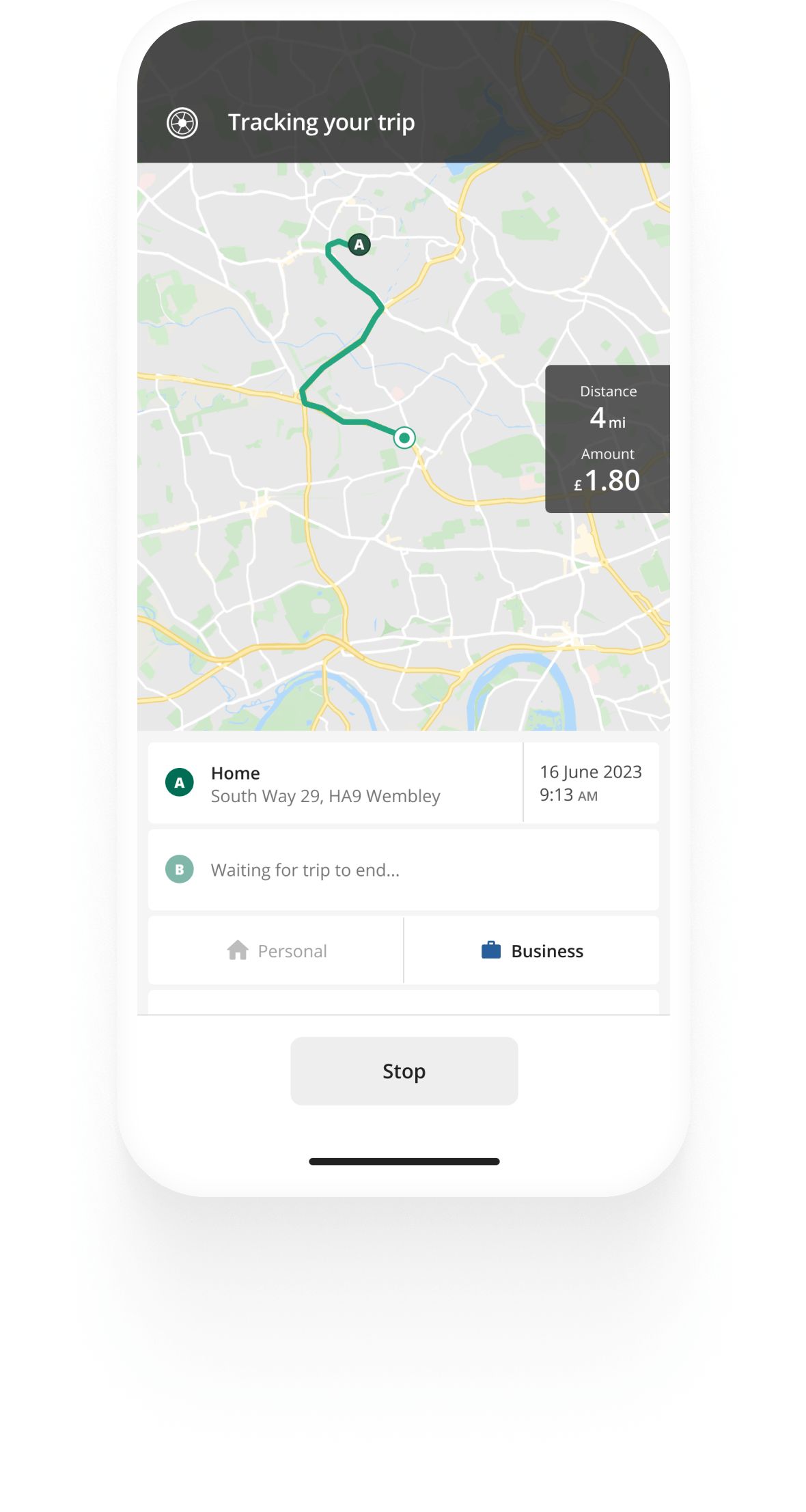Track mileage automatically
Get started
Small business mileage reimbursement in the UK
You own a small business and you or your employees drive your own vehicles for work. You know that you can receive mileage deductions for business-related driving. Great! Now, how does that actually work?
Are you self-employed? See our dedicated mileage deductions guide for the self-employed.
Small business mileage reimbursement
Small business owners and their employees are entitled to mileage reimbursement so long as they drive for business purposes. Business mileage is driving between two places of work. This can include but is not limited to visiting clients, driving out for supplies, and generally running business errands. Note that ordinary commuting is not considered business mileage.


Mileage tracking made easy
Trusted by millions of drivers
Automate your mileage log Automate your mileage log

Automatic mileage tracking and HMRC-compliant reporting.
Get started for free Get started for freeReimbursing employees
As a business owner, it is generally expected that you provide employees with a small business mileage reimbursement for their work-related driving. HMRC sets an advisory mileage allowance rate each year that you can use as a guideline for the payouts. The mileage rate covers all expenses of owning and running employees’ vehicles for the business portion of their driving.
HMRC announced the 2025/2026 mileage allowance rates, which remain unchanged from last year.
It is standard practice for big and small businesses alike to reimburse employee business mileage at the advised rate of 45p per mile, but you can choose to reimburse at a lower or higher pence per mile.
Bear in mind that if you provide small business mileage reimbursement at a lower than the HMRC mileage rate, employees are entitled to claim mileage deductions on their taxes to make up the difference to the HMRC rate. If you reimburse employees at a higher than the HMRC rate, any amounts over the standard will be taxed as a part of their income.
You can also choose to not pay out mileage reimbursement at all. In this case, employees will be able to claim mileage deductions at the HMRC mileage allowance rate on their annual tax return.
Learn more about the HMRC mileage rates and mileage claims.
Records requirements for small business mileage
In order to claim small business mileage deductions, you and your employees must produce mileage records that adhere to HMRC requirements. A mileage log must contain the date and purpose of each business trip, as well as the distance and start and end addresses, including postcodes.
There are a few ways your small business can keep mileage records for deductions. You can do so manually, in the form of a paper log book or a spreadsheet, or use a small business mileage tracker.
Small business mileage tracking
Even the most organised business owners and employees will find manually documenting all required details trips into a central spot tedious. Mileage tracking apps can automatically record mileage, keep historical mileage records, and make reimbursements and deductions a breeze.
Mileage trackers are becoming more and more used within small businesses, due to their ability to simplify the recording of work-related mileage and help with creating HMRC-compliant records.
You can find many mileage tracking apps and software, but keep in mind some might be heavier and more expensive to use - they are more suitable for larger enterprises.
Choosing a small business mileage tracker
A small business mileage tracker will be able to cover all of your needs and HMRC requirements, and won’t financially burden your business. Here are some of the important features you should be looking for in a small business mileage tracker:
- Automatically tracks mileage and records all the required by the tax authority information
- Can generate HMRC-compliant mileage logs
- Has online backup and mileage reports are always available in case of future tax audits.
There are lots of different options out there that we encourage you to explore. One option is the Driversnote app which comes with all essential features for a small business mileage tracker.
FAQ

Tired of logging mileage by hand?
Effortless. HMRC-compliant. Liberating.
Top posts
- HMRC travel expenses guidelines
- HMRC advisory fuel rates 2025
- Automate mileage tracking in healthcare with Driversnote Teams UK
Related posts
Free mileage log book template
Latest update: 7 May 2025 - 2 min read
Whether you're an employee or a business owner, it's crucial to keep good mileage records in a mileage log book.
HMRC Mileage Guide
Latest update: 2 April 2025 - 5 min read
Welcome to our guide on mileage claims and reimbursement in the UK. This guide will walk you through the rules that apply to your situation.
HMRC travel expenses guidelines
Latest update: 6 January 2026 - 2 min read
This guide for employers, employees, and sole-traders offers an overview of what you need to know if you're seeking tax relief or reimbursement for travel expenses.
.svg)

